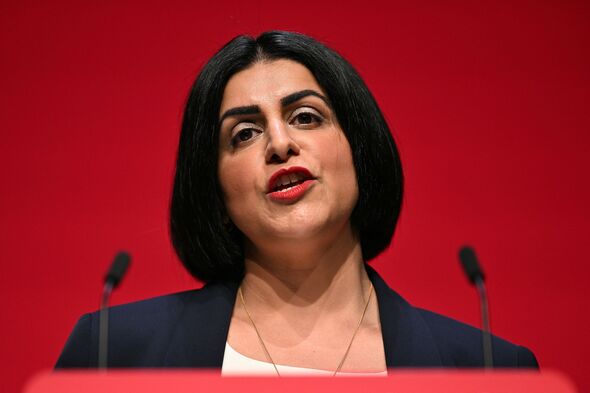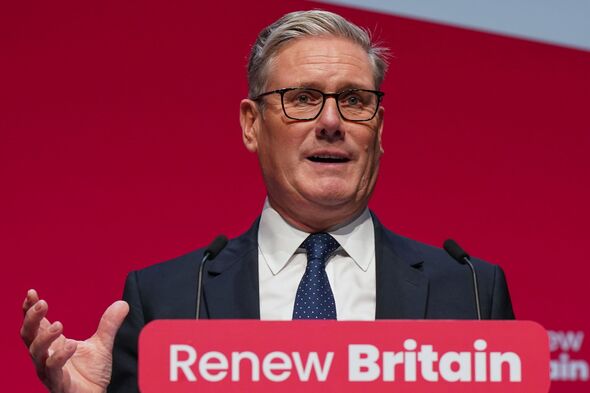
An overloaded dinghy in the English Channel (Image: Getty)
Labour’s newly unveiled immigration strategy has been sharply criticised by a leading immigration campaigner, who described the measures as ineffective and politically motivated. Alp Mehmet, chairman of Migration Watch UK, responded to the Home Secretary’s proposals, stating: “The lame measures proposed by Shabana Mahmood will have little impact on the inflow of both legal and illegal migration.
“What she said had more to do with placating disgruntled Labour voters, and not irking her party-activist audience too much, than addressing the root causes of the problem — the loss of control of our borders. The British people deserve better.” Ms Mahmood unveiled the government’s immigration plans at the Labour Party conference in Liverpool. The proposals include a new “contribution test” for migrants seeking indefinite leave to remain. Applicants would need to demonstrate proof of employment, English language proficiency, a clean criminal record, and evidence of community involvement.
Our community members are treated to special offers, promotions, and adverts from us and our partners. You can check out at any time. Read our Privacy Policy
Shabana Mahmood’s visa plans discussed on GB News
Ms Mahmood also announced plans to introduce digital identity cards to combat illegal working and pledged to suspend visas for countries that refuse to accept deported nationals.
The proposals were presented as part of a broader effort to regain control over the UK’s borders and maintain public support for migration policies.
Despite the government’s framing of the strategy, critics including Mr Mehmet argue that the measures are unlikely to have a significant effect on the scale of immigration.
The Office for National Statistics reported that the UK population increased by 755,300 in the year to mid-2024, with net migration accounting for nearly all of that growth. Migration Watch UK has repeatedly warned that unless net migration is substantially reduced, pressures on housing, healthcare, and other public services will continue to rise.

Home Secretary Shabana Mahmood (Image: Getty)
Mr Mehmet added: “Immigration will go on adding hundreds of thousands of people to our population every year. The UK population increased by 755,300 in the year to mid-2024, nearly all of it due to immigration. Paired with a failure to build the necessary infrastructure, this will inevitably reduce living standards.”
His comments reflect wider concerns about the capacity of public services to cope with sustained high levels of migration, particularly in urban areas where demand for housing and healthcare is most acute.
The government’s immigration proposals have also sparked debate within the Labour Party. Some members have expressed concern that the measures could alienate core supporters, while others worry that the policies could create tension between the party’s traditional principles and its efforts to appeal to a broader electorate.
Labour’s immigration strategy includes several key elements aimed at tightening border control and reducing illegal migration. The “contribution test” for migrants seeking indefinite leave to remain is central to these plans.
This test requires applicants to demonstrate that they have contributed positively to society through employment, community involvement, and adherence to legal standards. The introduction of digital identity cards is another significant aspect of the strategy. These cards are intended to combat illegal working by providing a secure and verifiable means of identification.
The government has announced that digital IDs will be mandatory for Right to Work checks by the end of the current Parliament.

Prime Minister Sir Keir Starmer (Image: Getty)
In addition to these measures, the government has pledged to suspend visas for countries that refuse to accept deported nationals.
This policy aims to ensure that individuals who have been ordered to leave the UK are returned to their home countries, thereby reducing the number of individuals remaining unlawfully in the country.
Despite the government’s efforts, the scale of illegal migration remains a significant challenge. In 2024, approximately 37,000 people were detected crossing the English Channel in small boats, a 25% increase from the previous year.
This trend has continued into 2025, with over 33,000 arrivals recorded so far. The majority of these individuals claim asylum upon arrival, placing additional pressure on the UK’s immigration and asylum systems.
The government’s response to these challenges includes the introduction of the “one-in, one-out” policy in collaboration with France. This agreement allows the UK to return migrants who have crossed the Channel illegally, while accepting an equal number of migrants from France who meet specific criteria.
However, critics argue that this policy has had limited success, with reports indicating that French authorities have intercepted only a fraction of the migrants attempting to cross the Channel.
As the government moves forward with its immigration strategy, the effectiveness of these measures will be closely monitored. Critics maintain that without a substantial reduction in migration numbers, the challenges facing public services and communities will persist.
The debate over the government’s approach underscores the complexities of balancing border control with humanitarian obligations and the need for comprehensive solutions to address the multifaceted issue of migration.















